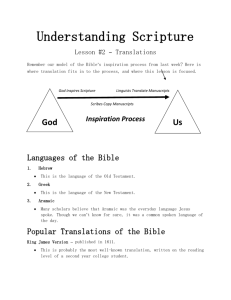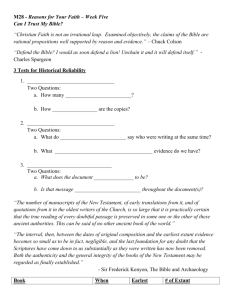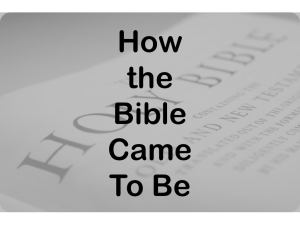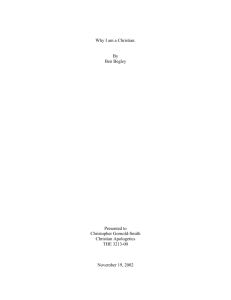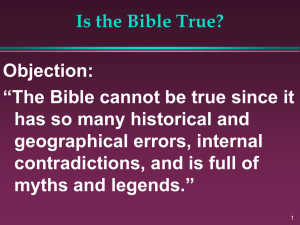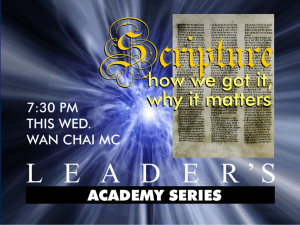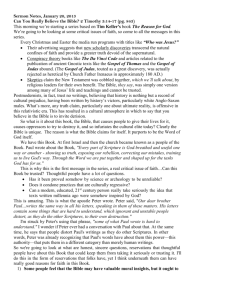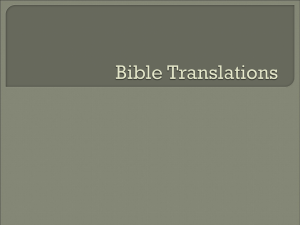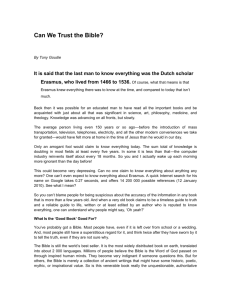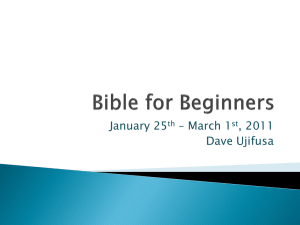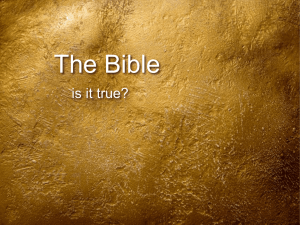How we got the Bible - Braggs Church of Christ
advertisement
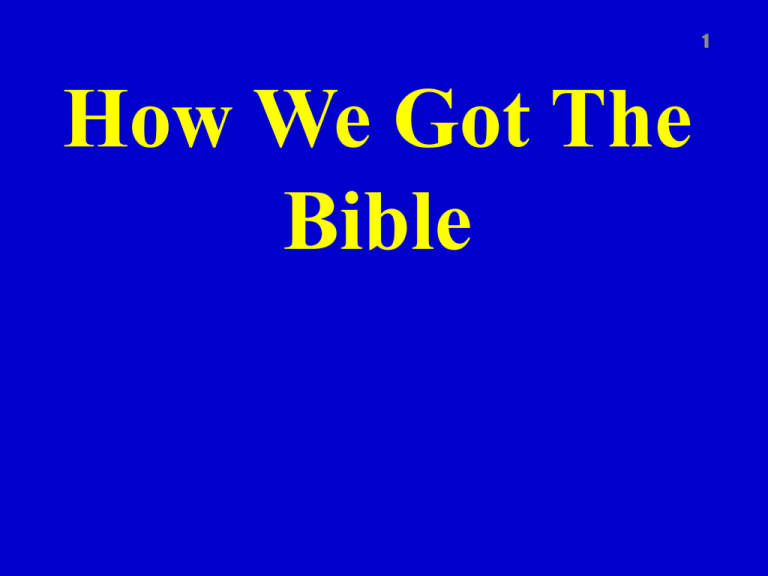
1 How We Got The Bible 2 Introduction • There are no original copies of the books of the Bible in existence today • How do we know that what we have is accurate? 3 Introduction • “The story of how we got our English bible demonstrates the power and providence of God.” 4 Transmission • There is a chain of transmission from God to man • The chain that connects man to God is his word! God What about the links in the middle? Bible 5 6 Transmission • 1. First link is God • 2 Tim. 3:16-17 7 2 Tim. 3:16-17 • All scripture is given by inspiration of God, and is profitable for doctrine, for reproof, for correction, for instruction in righteousness: That the man of God may be perfect, throughly furnished unto all good works. 8 Transmission • 2. Second link is Jesus, the Son of God • Heb. 1:1-2 9 Heb. 1:1-2 • God, who at sundry times and in divers manners spake in time past unto the fathers by the prophets, Hath in these last days spoken unto us by his Son, whom he hath appointed heir of all things, by whom also he made the worlds; 10 Transmission • 3. The third link in the chain is the Holy Spirit • Jn. 14:26 11 Jn. 14:26 • But the Comforter, which is the Holy Ghost, whom the Father will send in my name, he shall teach you all things, and bring all things to your remembrance, whatsoever I have said unto you. 12 Transmission • 4. The Holy Spirit revealed the Word to inspired men, the fourth link 13 2 Pet. 1:20-21 • Knowing this first, that no prophecy of the scripture is of any private interpretation. For the prophecy came not in old time by the will of man: but holy men of God spake as they were moved by the Holy Ghost. 14 Transmission • 5. These men delivered God’s message through preaching and writing – and these original writings became the fifth link 15 1 Cor. 14:37 • If any man think himself to be a prophet, or spiritual, let him acknowledge that the things that I write unto you are the commandments of the Lord. 16 Col. 4:16 • And when this epistle is read among you, cause that it be read also in the church of the Laodiceans; and that ye likewise read the epistle from Laodicea. 17 Transmission • 6. Copying of the original letters became the next link • This led to a series of other links like early translations, the printing press, collection of manuscripts etc. 18 Transmission • Each of these helped complete the chain that connects our modern English Bible to heaven 19 Books • God chose to preserve His Word in a book (scroll form and codex or book form) • God did speak to the fathers and prophets directly 20 Books • When it came to completing the revelation and preserving it for all time – God chose to put it in a book 21 Ex. 17:14 • And the LORD said unto Moses, Write this for a memorial in a book, and rehearse it in the ears of Joshua: for I will utterly put out the remembrance of Amalek from under heaven. 22 Hab. 2:2 • And the LORD answered me, and said, Write the vision, and make it plain upon tables, that he may run that readeth it. 23 Books • • • • • Books are: Durable Easily passed around Dependable We can look up what is written 24 Acts 17:11 • These were more noble than those in Thessalonica, in that they received the word with all readiness of mind, and searched the scriptures daily, whether those things were so. 25 Manuscripts • Manuscripts were hand written copies • Before Gutenberg invented the moveable type press in the 1400’s, all copies of a document were done by a scribe’s hand 26 • “The New Testament was written between approximately A.D. 35 and A.D. 100. Among the books in the New Testament are letters that were sent to congregations of the Lord’s church from the apostle Paul. Those letters were priceless to those who received them. Because of that, copies sometimes were made. 27 • Unlike the scribes who copied the Old Testament, people who copied the New Testament books did not see the need to bury or burn old, worn-out copies of the Scriptures. As a result, we still possess literally thousands of manuscripts of the New Testament” Kyle Butt 28 Deut. 17:18 • And it shall be, when he sitteth upon the throne of his kingdom, that he shall write him a copy of this law in a book out of that which is before the priests the Levites 29 Col. 4:16 • And when this epistle is read among you, cause that it be read also in the church of the Laodiceans; and that ye likewise read the epistle from Laodicea. 30 Mt. 2:4 • And when he had gathered all the chief priests and scribes of the people together, he demanded of them where Christ should be born. 31 The N.T. & Other Ancient Books Title of Book Date Written Date of Earliest Manuscript Number of Manuscripts Iliad unknown 643 A.D. 400 9 A.D. 125 5735 700 B.C. Josephus’ A.D. 70 Jewish Wars New A.D. 35Testament 100 Kyle Butt 32 Manuscripts • “More than 5,300 Greek manuscripts (in part or whole) of the NT are available to scholars today. Some of these go back to the very shadows of the first century.” Wayne Jackson 33 Early Christian Writings • Christians of the early 2nd century and beyond produced a large number or written works • Commentaries, sermon books, harmonies of the Gospels etc. 34 Early Christian Writings • They were not inspired but they often quoted lengthy portions of Scripture. Their writings provide another witness to the inspired text 35 Translations • Older translations of the Bible help identify the early text of the Bible • Besides manuscripts of the Bible we also have manuscripts of early translations of the Bible 36 Translations • “Translations are versions of the Greek NT rendered into other languages. There are more than 10,000 copies of the NT in various languages…” Wayne Jackson 37 Conclusion • Acts 14:17 • Nevertheless he left not himself without witness, in that he did good, and gave us rain from heaven, and fruitful seasons, filling our hearts with food and gladness. 38 Conclusion • “Here (The Word of God) God revealed His mind, His Son, and Himself. In the pages of the Bible we find the means by which we can know Him --Obedience” 39 References • From God’s Mind To Man – The Bible, Wayne Jackson (http://www.christiancourier.com/) • How We Got The Bible, Sam Dilbeck, Southwest Lectures, 2011 (http://swcofc.org/lectureship/)
